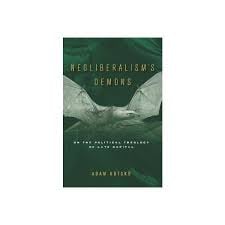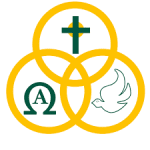Here I begin discussion of theologian Adam Kotsko’s 2018 book Neoliberalism’s Demons: On the Political Theology of Late Capital (Stanford University Press). Earlier I posted some remarks about the Introduction; I’ll skip that here and go to Chapter 1: The Political Theology of Late Capital.
If you have read the chapter, feel free to comment on it. If not, only ask a question. In either case, follow my rules (stated below).
I often tell my students that when they are starting to read a difficult chapter, go directly to the last paragraph (or two) and see if that gives the “gist” of the chapter. Then go back and read the chapter in light of that. That certainly works in this case. On page 38 Kotsko says: “Overall, then, in neoliberalism an account of human nature where economic competition is the highest value leads to a political theory where the prime duty of the state is to enable, and indeed mandate, such competition, and the result is a world wherein individuals, firms, and states are all continually constrained to express themselves via economic competition. This means that neoliberalism tends to create a world in which neoliberalism is ‘true.’ A more coherent and self-reinforcing political theology can scarcely to imagined—but that, I will argue, is precisely what any attempt to create an alternative to neoliberalism must do.”
Much of the chapter involves explanation of “political theology.” I think the definition given actually fits “ideology” better. It is a case where ideology is simply being called “theology” because of its elevation of something to the status of a god, an ultimate concern. (Kotsko even mentions Tillich’s definition of “religion” as “ultimate concern.”) In any case, for Kotsko and for me neoliberalism is an ideology which means a descriptive and prescriptive account of reality, especially social reality. What seems really to be the case is that neoliberalism assumes such an account of social reality and then creates an economic system consistent with it. Remember, an ideology is both descriptive AND prescriptive.
The rest of Chapter 1 leads up to that concluding paragraph, laying out the reasons for it. Kotsko discusses several philosopher-sociologists who wrote about neoliberalism, beginning with Milton Friedman who seems to have coined the term itself.
In the chapter, Kotsko interacts with some ideas such as “sovereign is he who decides on the exception” to argue that politics can and often does become a kind of imperial theology, taking the place of, for example, divine right of kings. One of his own sparkling aphorisms is “desperation to stave off the worst [e.g., economic collapse or anarchy] at any cost turned out to be the party toward the very worst.” (28) There he is referring to Hitler, but the aphorism is meant as a warning against adopting extreme strategies to avoid a feared social outcome.
In this chapter, Kotsko comes closest to defining or describing neoliberalism, something he admits is a difficult task, on page 34. Then, on the same page, he posits that “Overall, increasing inequality appears to be the most consistent outcome of neoliberalism.” The question that remains is: Is that outcome intended by neoliberals? And, if so, why?
The point of reading this book is that I am always interested in claims about what “theology” is. During my doctoral studies I focused on theological methodology from Schleiermacher to Rahner and Gutierrez (and many theologians in between). Kotsko’s claim that neoliberalism is a theology catches my attention. I still think it is an ideology, but I admit that ideology and theology can overlap, especially when an ideology becomes an opportunity for idolatry. Then Christian theology, which ought to be and is properly prophetic, deconstructs it, or should.
*Note: If you choose to comment, make sure you have read the chapter. If not, you may ask a question. In any case, keep your comment or question under 100 words, on topic, addressed to me, civil and respectful, not hostile or argumentative, and devoid of pictures or links.*
















